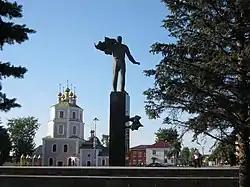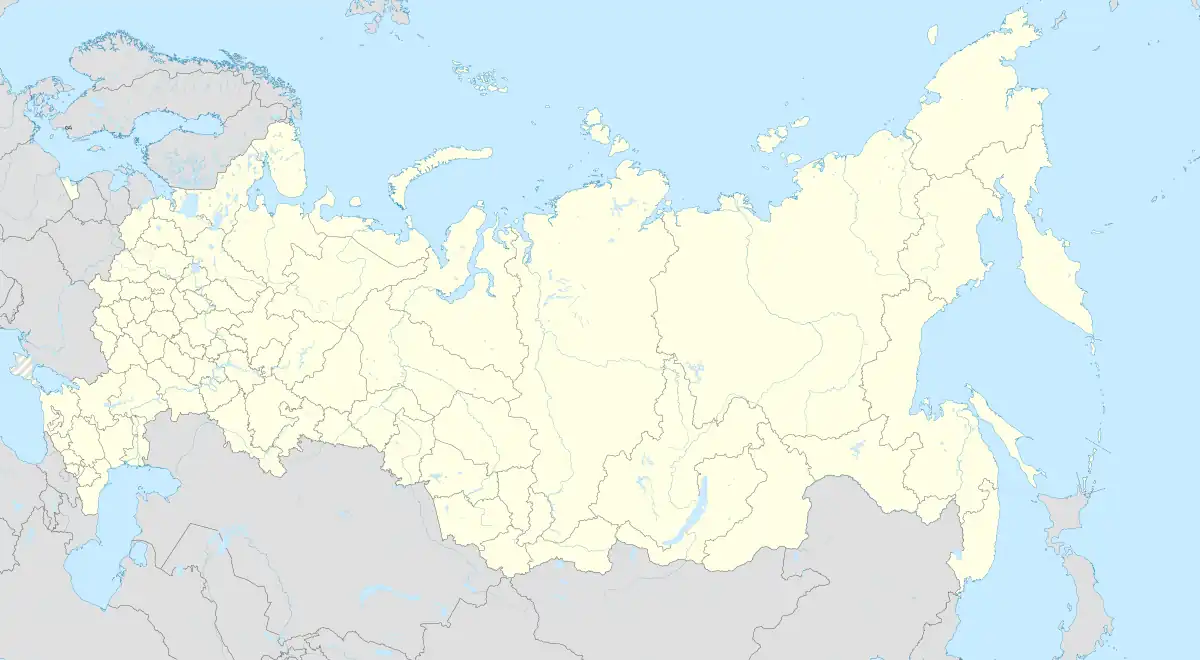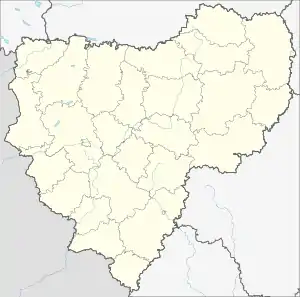Gagarin
Гагарин | |
|---|---|
 Monument to Yuri Gagarin in the town | |
.png.webp) Flag  Coat of arms | |
Location of Gagarin | |
 Gagarin Location of Gagarin  Gagarin Gagarin (Smolensk Oblast) | |
| Coordinates: 55°33′N 35°01′E / 55.550°N 35.017°E | |
| Country | Russia |
| Federal subject | Smolensk Oblast[1] |
| Administrative district | Gagarinsky District[1] |
| Urban settlement | Gagarinskoye[1] |
| Founded | 1718[2] |
| Town status since | 1776[2] |
| Government | |
| • Mayor[3] | Andrey Puzikov (acting)[3] |
| Area | |
| • Total | 17.93 km2 (6.92 sq mi) |
| Elevation | 194 m (636 ft) |
| Population | |
| • Total | 31,721 |
| • Estimate (2018)[5] | 29,041 (−8.4%) |
| • Density | 1,800/km2 (4,600/sq mi) |
| • Capital of | Gagarinsky District,[1] Gagarinskoye Urban Settlement[1] |
| • Municipal district | Gagarinsky Municipal District[6] |
| • Urban settlement | Gagarinskoye Urban Settlement[6] |
| • Capital of | Gagarinsky Municipal District,[6] Gagarinskoye Urban Settlement[7] |
| Time zone | UTC+3 (MSK |
| Postal code(s)[9] | 215010, 215059 |
| Dialing code(s) | +7 48135 |
| OKTMO ID | 66608101001 |
| Website | www |
Gagarin (Russian: Гага́рин), known until 1968 as Gzhatsk (Гжатск), is a town and the administrative centre of Gagarinsky District of Smolensk Oblast, Russia, located on the Gzhat River, 240 kilometers (150 mi) northeast of Smolensk, the administrative centre of the oblast. Population: 31,721 (2010 Census);[4] 28,789 (2002 Census);[10] 28,867 (1989 Census).[11]
The town's former name is from that of the Gzhat River, which is of Baltic origin (cf. Old Prussian gudde, meaning "forest").[12]
Geography
Climate
Gagarin has a warm-summer humid continental climate (Dfb in the Köppen climate classification).
| Climate data for Gagarin | |||||||||||||
|---|---|---|---|---|---|---|---|---|---|---|---|---|---|
| Month | Jan | Feb | Mar | Apr | May | Jun | Jul | Aug | Sep | Oct | Nov | Dec | Year |
| Mean daily maximum °C (°F) | −5.1 (22.8) |
−4.2 (24.4) |
1.4 (34.5) |
10.5 (50.9) |
17.1 (62.8) |
20.1 (68.2) |
23 (73) |
21.3 (70.3) |
15.5 (59.9) |
8 (46) |
1.7 (35.1) |
−2.3 (27.9) |
8.9 (48.0) |
| Daily mean °C (°F) | −7.2 (19.0) |
−6.8 (19.8) |
−1.9 (28.6) |
6.1 (43.0) |
12.9 (55.2) |
16.4 (61.5) |
19.3 (66.7) |
17.6 (63.7) |
12.1 (53.8) |
5.6 (42.1) |
−0.1 (31.8) |
−4.1 (24.6) |
5.8 (42.5) |
| Mean daily minimum °C (°F) | −9.6 (14.7) |
−9.8 (14.4) |
−5.6 (21.9) |
1.1 (34.0) |
7.8 (46.0) |
11.7 (53.1) |
14.9 (58.8) |
13.5 (56.3) |
8.6 (47.5) |
3.2 (37.8) |
−1.9 (28.6) |
−6.1 (21.0) |
2.3 (36.2) |
| Average precipitation mm (inches) | 49 (1.9) |
42 (1.7) |
43 (1.7) |
43 (1.7) |
74 (2.9) |
79 (3.1) |
88 (3.5) |
75 (3.0) |
64 (2.5) |
63 (2.5) |
54 (2.1) |
49 (1.9) |
723 (28.5) |
| Source: https://en.climate-data.org/asia/russian-federation/smolensk-oblast/gagarin-762161/ | |||||||||||||
History
In 1718, a village on the territory of modern Gagarin was transformed by a decree of Peter the Great to a transshipment landing stage (called Gzhatsky landing stage).[2] From the mid-18th century, Gzhatsk was a sloboda, and in 1776, by a decree by Catherine the Great, it was granted uyezd town status[2] and a coat of arms showing "a barge loaded with bread ready for departure, on a field argent", meaning that the town was a good landing stage for grain.
The town was built at the crossing of the Moscow road (east-west) and the Smolensk road (north-south, paralleling the river). By the plan of 1773, it was laid out in triangular form. One part paralleled the Gzhat River, another—the road to Moscow, and the base of the triangle connected them.
On August 29, 1812, in the village of Tsaryovo-Zaymishche near Gzhatsk, Mikhail Kutuzov accepted command of the Russian army. On the day of Napoleon's invasion, the town was set on fire and burned for several days. It was near Gzhatsk where Denis Davydov's guerrilla group started to operate. Russian troops entered the town again on November 2, 1812. When the town was rebuilt in 1817, the former regular layout was basically kept.
On November 13 [O.S. October 31], 1917, Soviet power was proclaimed in Gzhatsk and its uyezd. A year later, there was a counterrevolutionary insurrection.
During World War II, the town housed a flax factory, a sawmill, a brickyard, a roller-mill, a bakehouse complex, a weaving factory, a power station, and a number of guilds. In the course of the war, Gzhatsk was occupied by the German Army from October 9, 1941 until March 6, 1943, when it was liberated by the troops of the Soviet Western Front.
In 1968, the town was renamed Gagarin in honor of the first person to travel into space, Yuri Gagarin, who was born in 1934 in the nearby village of Klushino.
Administrative and municipal status
Within the framework of administrative divisions, Gagarin serves as the administrative center of Gagarinsky District.[1] As an administrative division, it is, together with one rural locality (the settlement of Trufany), incorporated within Gagarinsky District as Gagarinskoye Urban Settlement.[1] As a municipal division, this administrative unit also has urban settlement status and is a part of Gagarinsky Municipal District.[6]
International relations
References
Notes
- 1 2 3 4 5 6 7 8 9 Resolution #261
- 1 2 3 4 Энциклопедия Города России. Moscow: Большая Российская Энциклопедия. 2003. p. 102. ISBN 5-7107-7399-9.
- 1 2 Official website of Gagarin. Andrey Yuryevich Puzikov Archived August 15, 2014, at the Wayback Machine, acting mayor of Gagarin (in Russian)
- 1 2 Russian Federal State Statistics Service (2011). Всероссийская перепись населения 2010 года. Том 1 [2010 All-Russian Population Census, vol. 1]. Всероссийская перепись населения 2010 года [2010 All-Russia Population Census] (in Russian). Federal State Statistics Service.
- ↑ "26. Численность постоянного населения Российской Федерации по муниципальным образованиям на 1 января 2018 года". Federal State Statistics Service. Retrieved January 23, 2019.
- 1 2 3 4 Law #129-z
- ↑ Федеральная служба государственной статистики. Федеральное агентство по технологическому регулированию и метрологии. №ОК 033-2013 1 января 2014 г. «Общероссийский классификатор территорий муниципальных образований. Код 66 608 101». (Federal State Statistics Service. Federal Agency on Technological Regulation and Metrology. #OK 033-2013 January 1, 2014 Russian Classification of Territories of Municipal Formations. Code 66 608 101. ).
- ↑ "Об исчислении времени". Официальный интернет-портал правовой информации (in Russian). June 3, 2011. Retrieved January 19, 2019.
- ↑ Почта России. Информационно-вычислительный центр ОАСУ РПО. (Russian Post). Поиск объектов почтовой связи (Postal Objects Search) (in Russian)
- ↑ Russian Federal State Statistics Service (May 21, 2004). Численность населения России, субъектов Российской Федерации в составе федеральных округов, районов, городских поселений, сельских населённых пунктов – районных центров и сельских населённых пунктов с населением 3 тысячи и более человек [Population of Russia, Its Federal Districts, Federal Subjects, Districts, Urban Localities, Rural Localities—Administrative Centers, and Rural Localities with Population of Over 3,000] (XLS). Всероссийская перепись населения 2002 года [All-Russia Population Census of 2002] (in Russian).
- ↑ Всесоюзная перепись населения 1989 г. Численность наличного населения союзных и автономных республик, автономных областей и округов, краёв, областей, районов, городских поселений и сёл-райцентров [All Union Population Census of 1989: Present Population of Union and Autonomous Republics, Autonomous Oblasts and Okrugs, Krais, Oblasts, Districts, Urban Settlements, and Villages Serving as District Administrative Centers]. Всесоюзная перепись населения 1989 года [All-Union Population Census of 1989] (in Russian). Институт демографии Национального исследовательского университета: Высшая школа экономики [Institute of Demography at the National Research University: Higher School of Economics]. 1989 – via Demoscope Weekly.
- ↑ Е. М. Поспелов. Географические названия мира (Москва, 1998), стр. 110.
- ↑ "Города-побратимы". gagarinadmin.ru (in Russian). Gagarin. Retrieved February 5, 2020.
Sources
- Администрация Смоленской области. Постановление №261 от 30 апреля 2008 г. «Об утверждении реестра административно-территориальных единиц и территориальных единиц Смоленской области», в ред. Постановления №464 от 27 июня 2014 г. «О внесении изменений в реестр административно-территориальных единиц и территориальных единиц Смоленской области». Опубликован: База данных "Консультант-плюс". (Administration of Smolensk Oblast. Resolution #261 of April 30, 2008 On the Adoption of the Registry of the Administrative-Territorial Units and Territorial Units of Smolensk Oblast, as amended by the Resolution #464 of June 27, 2014 On Amending the Registry of the Administrative-Territorial Units and Territorial Units of Smolensk Oblast. ).
- Смоленская областная Дума. Закон №129-з от 28 декабря 2004 г. «О наделении статусом муниципального района муниципального образования "Гагаринский район" Смоленской области, об установлении границ муниципальных образований, территории которых входят в его состав, и наделении их соответствующим статусом», в ред. Закона №51-з от 30 мая 2013 г. «О внесении изменений в отдельные областные Законы». Вступил в силу со дня официального опубликования. Опубликован: "Вестник Смоленской областной Думы и Администрации Смоленской области", №14, часть I, стр. 98, 30 декабря 2004 г. (Smolensk Oblast Duma. Law #129-z of December 28, 2004 On Granting the Status of the Municipal District to the Municipal Formation of "Gagarinsky District" of Smolensk Oblast, on Establishing the Borders of the Municipal Formations the Territories of Which It Comprises, and on Granting Them Appropriate Status, as amended by the Law #51-z of May 30, 2013 On Amending Various Oblast Laws. Effective as of the official publication date.).
External links
 Media related to Gagarin (Smolensk Oblast) at Wikimedia Commons
Media related to Gagarin (Smolensk Oblast) at Wikimedia Commons- Official website of Gagarin (in Russian)
- Gagarin Business Directory (in Russian)